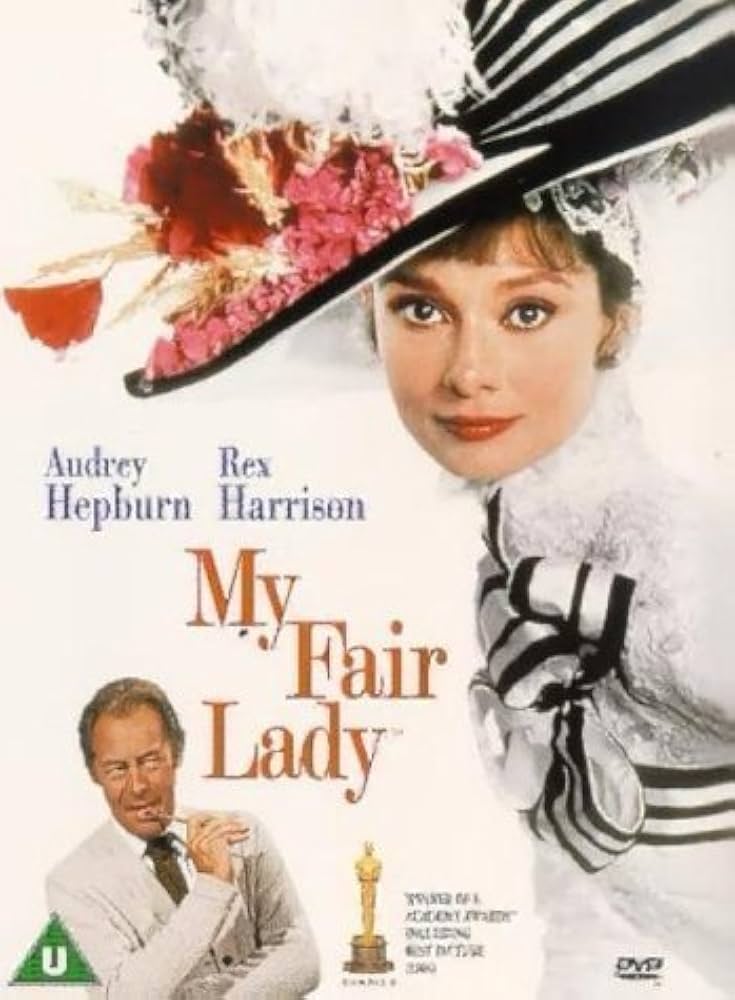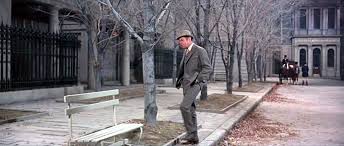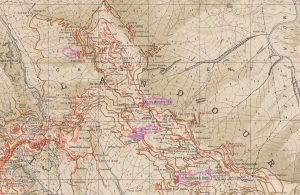
I grew up with My Fair Lady—and for you younger ones, that is not a reference to my mother or one of my sisters. It is a movie, and like a number of movies from my childhood—Those Magnificent Men in Their Flying Machines also comes to mind—they can be rather jarring to ear and eye today.
At its heart My Fair Lady is about the relationship between Professor Henry Higgins, ‘a pompous phonetics expert’, and Eliza Doolittle, ‘a poor Cockney flower girl’. Those phrases in inverted commas are offered by ChatGPT. Let’s stick with their summary of the storyline of the movie:
Eliza Doolittle sells flowers on the street and speaks with a strong Cockney accent. Professor Henry Higgins, an expert in phonetics, meets her and boasts to Colonel Pickering that he could transform Eliza into a refined lady simply by teaching her to speak “proper” English.
Eliza, eager to improve her social status, goes to Higgins’ home to ask for speech lessons. Higgins makes a bet with Pickering that he can pass her off as a duchess at an embassy ball in six months. Eliza moves in and endures intense and often demeaning training.
After many struggles, Eliza finally masters the refined accent and manners. She dazzles high society at the embassy ball, winning the bet for Higgins. However, after the triumph, she feels unappreciated and questions her identity and independence.
Eliza confronts Higgins, who is emotionally distant and dismissive. She considers marrying Freddie Eynsford-Hill, a young man infatuated with her. In the end, despite their differences and Higgins’ arrogance, Eliza returns to him—though the film leaves the nature of their future relationship ambiguous.
missing
It is a movie that is full of music and towards the end—with that final paragraph (above) as the context— Professor Higgins breaks out into this song: I’ve Grown Accustomed to Her Face.
The lyric to which I return, ever so often, is this one:
I’ve grown accustomed to her face … it’s second nature to me now—like breathing out and breathing in.
Silly me. It was only as I came back again to listen to the song more closely that I realised just how much I had been ripping those words out of context all these years. In the movie it is all rather soft and sweet and tender. Higgins is having to acknowledge that he misses Eliza—that the familiarity had brought content, if you like. The song expresses this wistful longing for Eliza to return and become a part of his elitist, pompous and mysogynist life once again.

dismissing
I’ve used those lyrics more for situations where ‘familiarity breeds contempt complacency’. It is not so much a wistful longing at work, but a wearied exposure. The impact has gone. I see, but I don’t see. I feel, but I don’t feel. It becomes more about dismissing than missing.
Take Ukraine and Gaza, for example. The words just roll off our tongues now, don’t they? Those intercessory prayers are sounding a bit stale, aren’t they? I’ve grown accustomed to their face … (their death and rubble) are second nature to me now—like breathing out and breathing in. And yes, I could add Nigeria, Bolivia, Venezuela, Myanmar etc etc—but that would be a separate post about ignorance, rather than one about familiarity.
I have been fearing for my heart. I don’t like what has been happening. And then I received some unexpected help, little nudges from very different sources just a few days apart.
Ukraine
A friend of mine, Mark, visited Ukraine earlier this month. I was part of a WhatsApp group that followed along, prayerfully, with him. At the end he shared all these photos with us on flickr. I was taken by surprise. The photos seemed to be all beauty and joy, food and friendship. I don’t remember any rubble. And a strange thing happened as I turned to re-engage with the media. Against this backdrop in those photos, I felt myself becoming less ‘accustomed to the face’ of the death and destruction. The contrast was so stark. This was happening to them, those people living those lives there in those photos. I’ve begun to see afresh. I’ve begun to feel afresh.
To the images, Mark added these words:
All that each of us can do is (I think) focus our limited capacities for attention, love and sacrifice on a handful of places and do deep dives on each one: to understand them historically, politically, culturally, and then find how to extend hands of friendship and solidarity where possible or appropriate.
So true. So wise. So possible.

Palestine
Seven days ago I had no idea who Charlie Kirk was. The only ‘Charlie’ I knew was a grandson born three days earlier. Our media portrayed him as this right-wing Christian extremist. So I thought I should have a listen and a watch for myself. You know what? I was surprised by how much I agreed with him. Sure, at times he was a bit too truthy-truthy and not enough gracey-gracey. But to be fair, he received far more intolerance than he ever dished out. And there’s no denying that he was a fellow believer, demonstrating considerable wisdom and courage. And now he leaves behind a little family mired in an unimaginable grief. Tragic.
But then I was surprised by something else. The inches and minutes the media have given to his death. Where has that come from? And this talk about ‘being at war with the left’. “What?” One man is killed and now we have a war from the left? My immediate reaction was, “What about the war from the right?” What about the rubble in Gaza and the tens of thousands of lives lost in that war from the right, sponsored by kindred spirits of Charlie Kirk? Do these lives count any less? Sure, there is evil on both sides, but the evil dished out by the Israelis is disproportionate to any evil they have received, is it not? One wonders if we’d be in this mess if we had just taken the plight of the Palestinians more seriously all those decades ago, when this all started.
Against the backdrop of this murder and this media coverage, I have been surprised. I have found myself becoming less ‘accustomed to the face’ of the death and destruction in Gaza. I’ve begun to see afresh. I’ve begun to feel afresh.

For myself, I don’t really see things in terms of ‘right’ and ‘left’. The call of Jesus, in the wider context of the Bible, is to another way of seeing altogether—one that can move us in either a so-called ‘right’ or a ‘left’ direction, depending on the situation. So I could never be a card-carrying member of the Christian right. Christian nationalism? Yikes. Does God define us by our national borders? Possibly, if a border is being oppressed out of existence (as in the Ukraine and Palestine, rather ironically)—but otherwise, I doubt it. What about all their talk about the (nuclear) family? Well, it doesn’t come from Jesus, that’s for sure. “Who are my brothers and sisters?” His idea of family involves ‘extending the circle of family’ to include, for starters, our sisters and brothers in Ukraine and Palestine. Yes, deep down in my little heart I find this elevation, to such heights, of nation and family to be idolatrous.
I don’t want to grow accustomed to this face. I don’t want it to become second nature to me, like breathing out and breathing in. In battling the familiarity that breeds complacency as we take our place in God’s world, it also helps to go back to God’s word. Not just hearing Jesus’ words, but being awakened by woke prophets like Amos and Micah, sinking deep into the complaints and laments in those Psalms, returning to those stinging, forever-contemporary images in Ecclesiastes 3 and 4—and going global with those Apostolic metaphors of the church, made possible by the death and resurrection of Jesus.
nice chatting
Paul
About Me

the art of unpacking
After a childhood in India, a theological training in the USA and a pastoral ministry in Southland (New Zealand), I spent twenty years in theological education in New Zealand — first at Laidlaw College and then at Carey Baptist College, where I served as principal. In 2009 I began working with Langham Partnership and since 2013 I have been the Programme Director (Langham Preaching). Through it all I've cherished the experience of the 'gracious hand of God upon me' and I've relished the opportunity to 'unpack', or exegete, all that I encounter in my walk through life with Jesus.
Recent Posts
Football helps me train preachers. See, when you speak to me about football—or, ‘footie’—I need to know where your feet are before I can understand what you mean. Are your feet in Ireland, or Brazil, or the USA, or NZ—or in crazy Australia? It must be the most fanatical sporting nation in the world. Within…
Having been born in 1959, I don’t remember much about the 1960s. But I have heard a lot. Hippies. Drugs. Rock ‘n Roll. Assassinations. Moon-walking. A quick trip across to ChatGPT informs me immediately that it was ‘a transformative decade across the world’—marked by the civil rights and feminist movements, Cold War tensions, consumerism and…








Thanks Paul. It’s so easy to dismiss the difficult topics you name. Thanks for helping us see what we are missing. I agree with you that too often ‘nation’ and ‘family’ have become idols; they simplify the world into black and white. Relationality and proportionality will be retained more when we remember gray afflicts not only the world but ourselves also.
Thanks Paul, so good
v strong, Paul
Thanks, Ian — and I have The Message of Humanity in my sights :).
Ahh, Joyanne—and the post was even written on your beloved Martin’s birthday.
How I miss him…! I have a son who carries his first name and now a grandson who carries his middle name.
Much love from us all
Yes, Mark — thanks for the inspiration (again !)